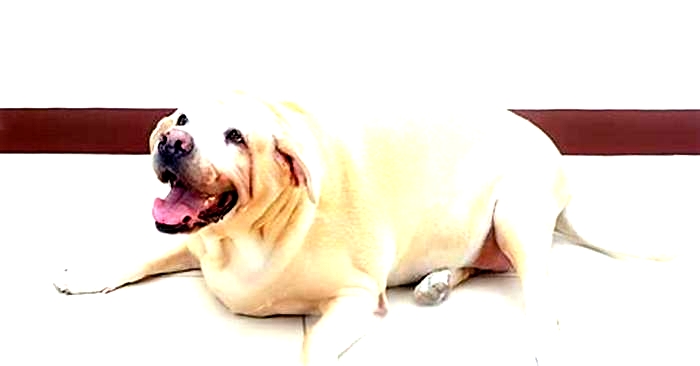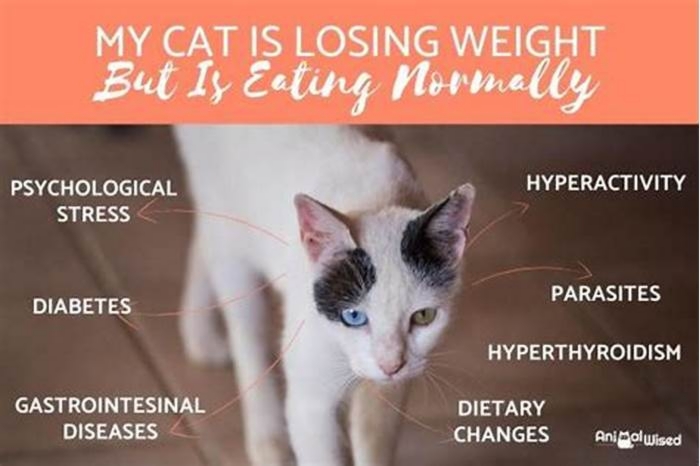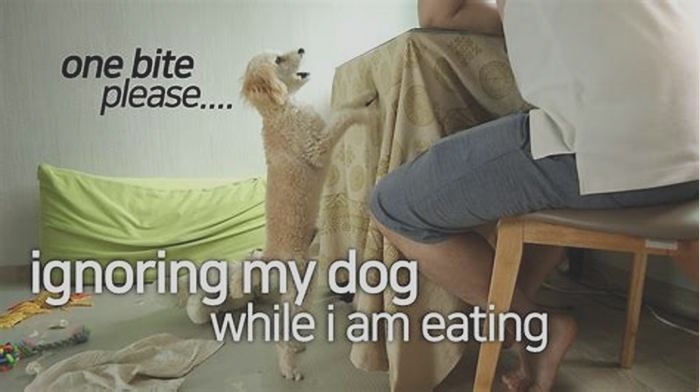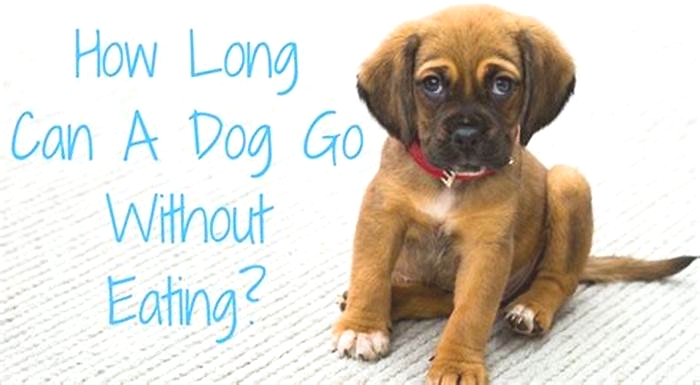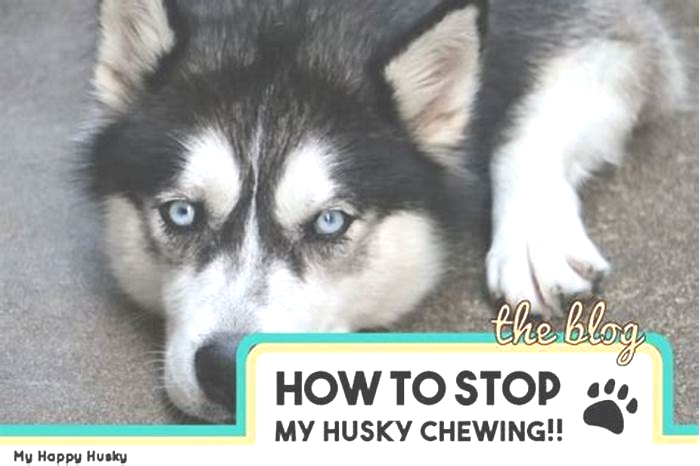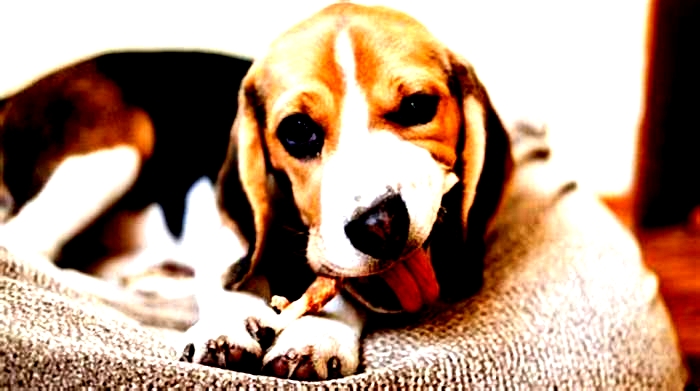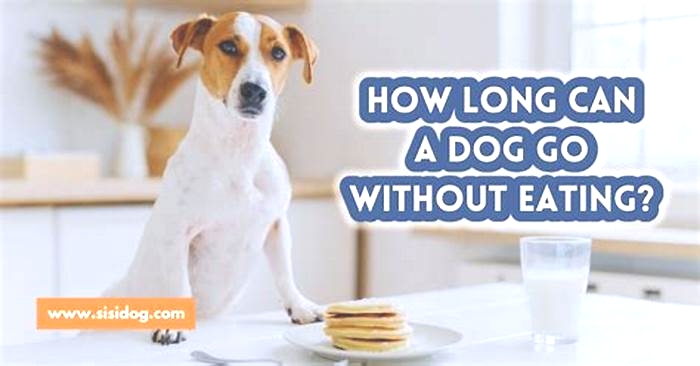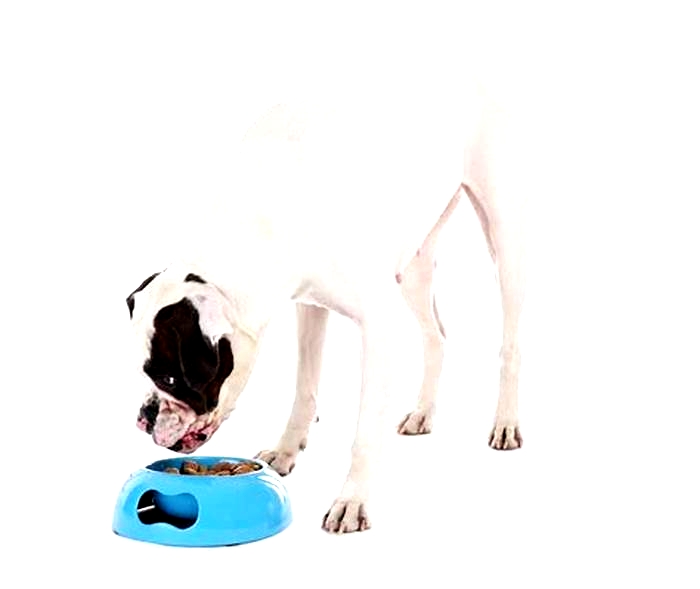Why is my dog getting fatter but not eating more
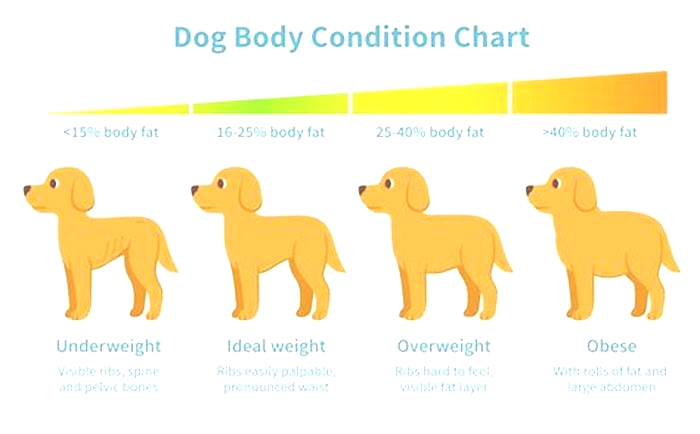
7 Medical Causes Behind Weight Gain
Your pet is overweight, and being the conscientious pet owner, you have made the necessary changes to your pets diet and activity levels, but your pet is still overweight. In fact, not only is he still overweight, he seems to be gaining more weight. If diet and exercise are not solving the problem, what else is there?
There are other valid reasons for weight gain besides eating habits and lack of activity. Here are seven of the most likely offenders.
Pregnancy
This is the most obvious cause of weight gain and potbellied appearances. Although it may seem obvious, some pet owners are completely unaware that their cat or dog is pregnant until there is a litter of little ones staring them in the face. If a female dog or cat is not spayed, she can become pregnant, and it does not take long for it to happen. A few unattended minutes in the backyard can lead to an unintended pregnancy.
So don't go putting your dog on a strict diet or exercise regimen just because she's gaining weight for no obvious reason. She may just be expecting.
Fluid Retention
A common side-effect of heart disease is a condition called ascites, the medical term used for excess fluid in the abdomen. The outward symptom is of an enlarged belly that is not coincident with overeating or lack of exercise. Other conditions can also cause the body to react in this way, including tumors or diseases of the internal organs. In very young animals, abnormal amounts of fluid in the abdomen may be the result of abnormal blood flow in the heart due to a congenital defect. Another cause of ascites may be linked to a portosystemic shunt, also referred to as a liver shunt, where the circulatory system bypasses (shunts) the liver.
In cats, feline infectious peritonitis (FIP) is one of the main causes of abdominal fluid retention.
Prescription Drugs
There are some prescription medications that can also lead to weight gain, especially if they are taken over a long period. If your pet is on any kind of medication and is also having a weight problem that you cannot control through simple food management and moderate exercise, you will need to consult with your veterinarian to see if the medication is related to the weight, and if a different medication or lower dose can prevent further weight gain.
Parasites
Internal parasites, especially the type that lodge in the abdominal walls and intestines (though not limited to those types), will often cause fluid to build up around the area of infestation, causing a potbellied appearance. This is often seen in young animals whose immune systems are not yet strong enough to resist the effects of parasitic infestation, and is more severe when there is a heavy load of internal parasites.
In the course of a standard examination, your veterinarian will take blood, fluid, and stool samples, one or more of which will show the presence of parasites in the body. Once the specific type of parasite is determined, your veterinarian will be able to prescribe the appropriate parasiticide.
Hypothyroidism
The thyroid glands are responsible for the production of thyroid hormones, the chief instigator for how quickly the body uses energy. That is, the speed at which energy is metabolized. Energy is taken into the body in the form of food, and under normal health conditions, the body burns this energy during the course of normal activity. However, under production of thyroid hormones can result in a sluggish metabolism, and too much energy being retained in the body, resulting in a burden of weight. The name for this condition is hypothyroidism, where the prefix hypo- means under. It can be confounding to observe that even while your pet is eating very little, she is continuing to gain weight. This is because even the small amount of food energy she is taking in is being stored rather than released through the metabolic process.
Some of the other symptoms seen with this disorder are fatigue, coarse hair coat, slow heart rate, and itchy, dry skin. Your veterinarian can conduct some straightforward blood tests to determine if your pet has an underlying case of hypothyroidism. If the diagnosis is positive for hypothyroidism, your doctor can prescribe medication to treat it
Cushings Disease (Hyperadrenocorticism)
Often seen in older animals, particularly older dogs, Cushings disease is a disorder that arises from long-term overproduction of glucocorticoid hormones, which are an important aspect of protein, carbohydrate, and metabolic regulation. This hormone is related to the adrenal glands (found near the kidneys) and pituitary glands, developing when something in one of these glands is abnormal.
With pituitary Cushings, the condition is most often caused by a tumor in the gland that is causing the gland to produce excess ACTH. This is the most common form of Cushings. With adrenal Cushings, the condition is caused by excess production of cortisol, a steroid hormone. Cushing s disease is commonly symptomized by muscle weakness and wasting, extreme thirst, increased appetite, urinary tract infections, rapid weight gain, and hair loss.
One of the most apparent outward symptoms is a potbelly, which is due to the wasting of muscles in the abdomen and the shifting of fat into the abdominal area. If you suspect that your pet has Cushing's disease, you will need to take your pet to a veterinarian for a full blood, urine, and chemistry profile.
Bloat
Some dogs, either because of their background, current living conditions, health or personal characteristic, will eat their dog food rapidly. This behavior is referred to as wolfing down food by some pet owners, and is often remarked upon as appearing as though the dog is swallowing its food without tasting or chewing it or gulping it down. This is, in fact, pretty much what is happening. As the dog wolfs down its food, it is also swallowing large amounts of air.
What follows is a stomach full of unchewed food and excess air, resulting in a condition called gastric dilatation and volvulus syndrome (GDV), more commonly referred to as bloat. Besides the obvious distended belly, dogs suffering from bloat will often have symptoms of troubled breathing, rapid heartbeat, pain in the abdomen (on touch), drooling and collapse. This is a life-threatening condition requiring immediate medical attention. Bloat is most often seen in large, deep-chested breeds of dogs, such as Great Danes, German Shepherds, and Standard Poodles.
When to Worry if Your Dog Isn't Eating (& What to Do)

Do you have a picky eater on your hands? A dog skipping meals is one of the most common issues that worries dog owners. Canine anorexia, the medical term for when a dog isn't eating, can be caused by a variety of health concerns, ranging from minor anxiety or stomach upset to much more serious conditions. Decode why your dog might not be eating, plus learn tricks to stimulate their appetite, and when it's time to call the vet.
Why Is My Dog Not Eating?
There are several reasons a dog might stop eating, including psychological issues like stress, and physical issues, including illness. It can be difficult to figure out which symptom - or combination of symptoms - is causing the issue. Keep in mind that evaluating your dog's appetite is complicated - there are so many factors to consider. Watch for changes in their eating habits, their body condition and weight, and any signs of illness.

1. Anxiety
Stress-related problems are among the many reasons a dog might stop eating. This is often the case with little dogs who are fussy eaters. Separation anxiety is a common cause of poor appetite in dogs. This can explain why some dogs only eat when you're around. Sometimes, an anxious dog won't eat while their owner is away, be it for an hour or a week. Others suffer anxiety with thunderstorms, fireworks, or other loud events that trigger an attack of nerves that can affect the appetite for days.
2. Pickiness
If your dog knows you just opened a new bag of treats or you have chicken in the oven, they might not eat their own dinner out of pickiness. Some dogs are also social eaters and only like to eat when other pets or people are around.
Quick Tip
Stick to a regular feeding schedule for your dog. This can help keep fussy eaters on track and eating consistently.
3. Travel
Dogs who have moved or are traveling with you may stop eating due to the stress of their new surroundings, but also because of physical issues surrounding these life changes, such as motion sickness. Your veterinarian can prescribe medication for the stomach upset and for anxiety, as well.
4. Digestion Issues
Indulging in too many treats can cause an upset stomach, which could make your dog too nauseous to eat. Rich foods can cause a serious condition in dogs called pancreatitis, so if your companion ate something very fatty, keep a close eye on them. Constipation can also severly reduce a dog's appetite. Take them to your vet right away if they show signs of a painful belly, vomiting, or diarrhea.
5. Worms
Intestinal worms are another common health issue that can cause a lack of appetite in dogs. A worm infestation can cause dogs to stop eating, and it's often accompanied by lethargy, weakness, and a bloated abdomen. If your dog has these symptoms, take them to your veterinarian to diagnose the particular parasite involved for effective treatment.
6. Depression
Depression in dogs follows much the same path as it does in humans, often heralded by lethargy, moodiness, and loss of appetite. Your dog's depression can be triggered by an event, such as the loss of a beloved family member, a move from one home to another, or, as in humans, a chemical imbalance can be to blame. If this is the case, treatment options are available that can help your furry friend recover their spunk.
Quick Tip
It can help to keep a food journal for your dog, writing down what and how much they eat every day, and any symptoms they may have. That way, you will notice problems early and can respond quickly.
7. Dietary Indiscretion
If your dog is fond of sneaking into the garbage, this can cause a condition commonly called "garbage gut" that can range in severity from a day or two of vomiting to a serious poisoning incident or an intestinal blockage that can be fatal. It's a good idea to call your vet if your dog stops eating after a midnight garbage raid. That way, you can be sure your faithful companion has not eaten something that could have disastrous effects.
8. Vaccinations
Some dogs can feel a little down in the dumps after getting vaccinations, which may lead to a low appetite for a short period. Usually, this lasts no more than a day or two, but if it goes on longer, or you notice any other signs of a vaccine reaction, contact your veterinarian.
9. Dental Disease
In addition to minor dental issues, such as a sore tooth, dogs can refuse to eat if they're suffering from major dental issues, including tooth root abscesses or a tumor in the mouth. Bring your dog in for a check-up right away if you notice any bleeding or growths in your dog's mouth.
10. Systemic Health Problems
Serious conditions that can cause a drop in appetite include thyroid problems, heart disease, pulmonary disease, kidney failure, and cancer, among many others. You may not notice accompanying symptoms in the beginning stages of many of these conditions, so take any decline in appetite with no obvious cause seriously.
Additional Causes for Canine Anorexia
In addition to the causes mentioned above, other issues that can make a dog stop eating include:
- Excessively warm weather
- Pain, usually from an injury or joint condition like arthritis
- Viruses or infections, such as parvo
- Pancreatitis
- Bloat, also known as Gastric Dilatation Volvulus
- Ulcers
- Breeding activity
- Chemotherapy or radiation treatments
Is My Dog Just Picky, Or Is It Serious?
Dogs sometimes skip a meal or even two, and they might turn up their nose at their food if you give them the same thing every day. This is fairly normal behavior, and waiting a few hours will probably resolve the issue once they figure out that they're hungry. However, if you see a sudden change in your dog's eating habits, and they flatly refuse to eat, something may be up. Follow these tips to help evaluate your dog's lack of appetite:
- Note your dog's age and health: If they're older, have digestive issues, or other health conditions, eliminate these as causes first.
- Watch your dog's behavior: Look closely for signs of anxiety, stress, or any changes in eating habits.
- Consider external factors: Life changes, such as a move or the arrival of a new pet or baby, or one-time events, such as vaccination, could be affecting their appetite.
Sudden changes are the red flag here. Take these three factors into consideration as you evaluate your dog. Eliminate potential health issues first. Next, address the behavioral component, and any events that may have impacted your dog's appetite. If you've looked at all of these things, spoken with your veterinarian, and your dog seems fine otherwise but is still turning their nose up to food, you might have a picky eater on your hands.
Tricks to Stimulate Your Dog's Appetite
If your dog seems to be acting normally with no other symptoms, there's no need to panic. Some dogs skip a meal but are enthusiastic eaters the next time. However, you don't want your dog to go too long without food, so there are a few things you can do to encourage them to eat.
- Warm their food. Warming the food before serving can entice a picky eater to eat. Zap it in the microwave for only a few seconds at a time to make sure it's not too hot for your dog - luke warm is the goal.
- Offer chicken or baby food. A few bites of a tasty yet bland food, such as boiled chicken or chicken baby food, can whet a dog's appetite. Make sure it doesn't contain any harmful additives like onion.
- Add some broth. The addition of warmed chicken or beef broth can stimulate your dog to eat their food. Use low-sodium broth or stock without any seasonings or additives.
- Try hand-feeding. Get down on the floor with your dog and offer them food from their bowl directly up to their mouth. If they're stressed, this can help them feel safe and calm enough to eat. However, only attempt this if your dog isn't food aggressive and there's no risk of them biting you.
- Withhold food. Some experts recommend withholding food for 12 hours to give the dog's digestive system a bit of time to recover. This can also allow your dog to become hungry and see if that encourages them to eat. However, never withhold food from puppies.
- Go for a walk. Getting in some movement could make your dog hungry, but it can also stimulate a bowel movement, which can help make your dog feel better if they're not eating because they're constipated.
-
Make sure they have water. Never deny your dog water. Keep plenty of fresh water available for your dog at all times. A thirsty dog may not want to eat.
- Talk to your vet. Whether your dog is a notoriously picky eater or this is the first meal they've ever skipped, it's never a bad idea to check in with your vet. They can provide personalized guidance or may even feel the need to prescribe an appetite stimulant.
Fast Fact
A dog should go no more than 24 hours without eating.
Consider a Switch to a New Food
Sometimes, dogs get tired of the same old thing. If your dog is just acting picky, and you're pretty sure they don't have an underlying medical condition after you consult with your veterinarian, it may be time to look at new dietary options. Poor nutrition and boredom can both play a role in a dog being fussy about their food.
You might want to try a raw diet, or you may just decide to start making their food at home. It's also possible to supplement with raw, or try a food topper by adding nutritional yeast to their diet. Talk to your vet about what your dog might be missing nutritionally, and if you decide to make the switch, go slowly to keep your dog from experiencing digestive upset. As long as you're careful, rotating your dog's diet and making changes can help revive your picky eater's appetite.
When to See a Vet if Your Dog Is Not Eating
Many dogs will occasionally skip a meal, and some will even skip two meals. You should contact your vet if your dog has gone more than 24 hours without eating. You should also see your vet immediately if your pet displays other symptoms, including:
- Fever
- Constipation
- Diarrhea
- Vomiting
- Low energy
- Refusing to drink water
- Showing obvious sign of pain or discomfort, such as limping, difficulty moving, restlessness
- Panting or labored breathing
- Drinking more water than usual (polydipsia)
- Unusual behavior for your dog such as hiding, shyness, trembling, confusion, or anything that seems "unlike" them
Puppies Who Aren't Eating
Puppies who will not eat are a particular source of concern, as they are in their initial growth stages, where eating and putting on weight are essential to their development. Puppies can also become dehydrated and develop low blood sugar very quickly if they don't eat. If you have a puppy who is 6 months or younger, bring them to your veterinarian if they have not eaten in eight to 12 hours.
You Know Your Dog Best
No one knows your dog's eating habits and other behaviors as well as you do, so use that knowledge to help your pet. If you know your dog is a picky eater, there might not be an immediate cause for alarm. But if you know they are normally a hearty eater, this sudden change in behavior may be a cause for concern. Don't hesitate to call your vet for advice if you're unsure to gain peace of mind.
2024 LoveToKnow Media. All rights reserved.


